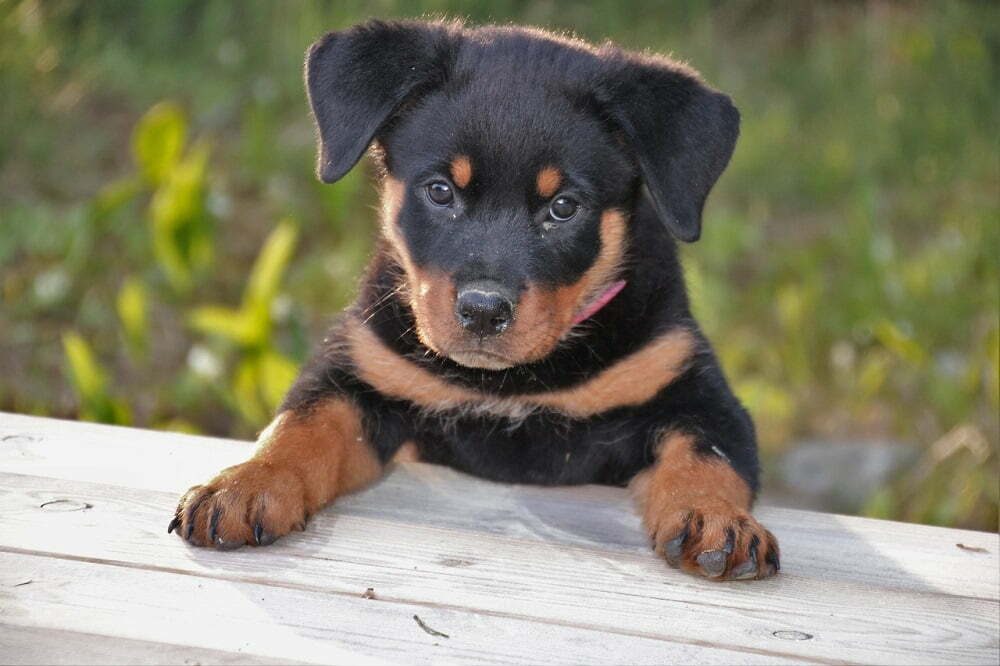A Rottweiler is a strong and handsome breed, with a large and loving heart. Despite having some bad publicity, Rottweilers are not actually a vicious or aggressive dog breed. Instead, the Rottie is a playful, gentle companion and with some early socialization and positive reinforcement training, the Rottweiler will be the perfect and loving family dog.
See below for everything you need to know about these – from breed characteristics to fun facts!

Key facts
Are you considering getting a Rottweiler? Or do you just want to know the basics? Below are some of the most important facts to consider when it comes to these gentler hard workers.
Average lifespan
The average lifespan of a Rottie is around 9-11 years. This is typical of larger breeds as they do not tend to live as long as smaller breeds. Don’t let this put you off however! You can still have a long and meaningful life with your Rottweiler!
Minimum exercise (per day)
The Rottweiler is a working breed which usually goes hand in hand with having a lot of energy, so if you’re looking for a couch potato, then the Rottweiler might not be for you. Your Rottie should get around 2 hours of exercise a day, made up from 10 – 30 min walks and lots of playtime!
Being a working dog Rotties will also need a lot of mental stimulation otherwise destructive tendencies could come out, though this can be said for any dog breed that doesn’t get the right exercise and mental nourishment.
There are lots of fun activities you can do with your Rottweiler and their intelligence and trainability made them excellent dogs for agility and obedience competitions! Not to mention they can also be used as therapy dogs or you could even put them to use in their traditional job role of cart/wagon pulling!
Coat length
A Rottweiler has a short double coat, that is straight and coarse. The outer coat of your Rottweiler shouldn be medium in length with the hair being much shorter around the head, ears and legs. The undercoat is found mainly on the neck and thighs and the amount of undercut your rottie has will vary depending on what climate they live in.
Minimum cost (per month)
Once you’ve got yourself a Rottweiler their continuing care will likely cost you anywhere between $150 to $300 per month. These ongoing costs will be made up from food, accessories (such as, toys, collars and any other extras they might need), vets bills, training and dog walkers or day care!
When it comes to dog food you should be looking to feed your Rottweiler the highest quality dog food you can. This is a large and muscular breed and a good quality food will help keep them strong and healthy. And whilst a poorer quality dog food may be cheaper, they may not be as cost effective as originally thought. Often not as nutritionally and this could lead to more frequent trips to the vets and with that comes expensive vets bills.
Appearance
With an adorable teddy bear face, distinct black and tan markings and large cuddly frame you cannot deny the Rottweiler is a handsome breed. When on the move you will see their famed strength and stamina in action and when you turn your attention to that sweet round face you will see soft brown eyes teeming with love and intelligence. The Rottie should appear fearless and alert but also gentle and affectionate.
Size
Classed as a large breed the Rottweiler is a dog with an impressive stature. These dogs have massive heads, large muscular frames and heavy bones, making the Rottweiler a dog of extreme strength and power.
Average height
A male Rottweiler will range anywhere between 24 to 27 inches tall at the shoulder, whereas females are slightly smaller standing at 22 to 25 inches tall.
Average weight
The average weight of a male Rottweiler is 95 to 130 pounds. A female typically weighs around 85 to 115 pounds.
Temperament

Anyone who has owned a rottweiler will know just how much of a cuddle bug these big dogs can be. Whilst they do have a reputation for being a dangerous breed, many fans of the breed know this is an untrue and hurtful accusation. WIth the correct breeding and training the Rottweiler is the perfect companion and the most loyal and loving family dog.
Apartment living
Whilst you Rottweiler could live in an apartment (and many do!) This is probably not the best environment for them. Being a larger dog they are going to need a good amount of space to live in and access to a backyard so that they can run about and play (and don’t forget about the frequent bathroom trips you would need to make with such a big dog!). This is why Rotties are much better suited to life in a large family home.
Good for novice owners
The Rottweiler is probably not the best choice for a novice dog owner.
For many of the reasons discussed in this article, we know that Rottweilers require a lot of work and dedicated training. If not properly trained and socialized we know these dogs can show aggressive tendencies and that’s the last thing you want for yourself or more importantly the dog. Not to mention their large size and strength! This is an aspect that can prove challenging to handle if you’ve never owned a dog before.
But if you’re serious about this breed and understand all of the downsides, are properly prepared, patient and determined there’s no reason why (even if you’ve never had a dog before) you couldn’t become a fantastic Rottweiler owner.
Sensitivity level
Despite their imposing appearance Rottweilers are quite sensitive souls. Gentle and loving at their core, these dogs are just big babies and do much better with positive reinforcement than negative reinforcement.
Tolerates being alone
All dogs are pack animals and the Rottweiler is no different. A sociable and people orientated breed, these dogs crave human company and have no issues pushing their big head into you or tapping you with their paws if they haven’t had enough attention.
Under no circumstances are Rottweilers to be kept outdoors. This is a serious pack breed and needs to be close to their families or they may begin to display signs of anxiety.
Tolerates cold weather
Rottweilers can handle cold weather better than a lot of other dog breeds. Their black double coat was developed to keep them warm and despite the shorter length of fur they can withstand the cold quite well. Rottweiler’s can handle temperatures higher than 40 degrees farenheit safely but they should not be kept at temperatures any lower than that.
Tolerates hot weather
Rottweilers can adapt to hot weather quite well, especially when the correct precautions are taken. It is very important that no matter what breed of dog you have, that you supply lots of fresh cool water and shade to keep them cool when temperatures soar. It is not advised to keep your Rottweiler outdoors for too long in hot weather or they may get heat stroke and become dehydrated.
Affectionate with family
Rottweilers form very strong bonds with their families. There is nothing your Rottie wants more than to spend quality time with you either playing or trying to climb into your lap for a cuddle.
Due to their immense love for their families, Rotties can become very protective of them, making them intimidating guard dogs! But with the correct encouragement and training this can be controlled.
Kid-friendly
If your Rottie is raised around children, or has had lots of exposure to them they should get along absolutely fine. They must of course be taught what kind of behaviour is acceptable as they have a natural tendency to herd and may bump into children in an attempt to do so. Due to their large and sturdy size, if your Rottweiler does bump into a small child or toddler it could cause them to fall and injure themselves.
Rottweilers can also be known to have a strong prey drive and may get overly excited when children run around, squeal and play. Make sure to always supervise when your Rottweiler and children are together and remember to teach your children the correct way to interact with dogs regardless of the breed.
Dog friendly
Some Rottweilers can be aggressive towards dogs they dont know especially if they are of the same sex. It is important that you introduce your Rottie to any new dogs carefully and under supervision to avoid any unwanted aggression. A good way to combat this is to make sure your Rottie is well socialized as a puppy so that new dogs and experiences do not phase them.
Due to quite a high prey driver, Rotties are probably not well suited to households with small furries such as cats or rabbits.
Friendly towards strangers
Again, Rottweilers are protective, family-originated dog,s and like with dogs they don’t know they can also be wary of strangers. This natural guarding instinct is just part of their genetic history, but due to their power and strength, this can become problematic. Just remember that Rotties are not bad dogs and with consistent and firm training you should have no reason for concern.
Health and grooming
Shedding
Like most short, double coated breeds, Rottweilers are seasonal shedders. This means that the amount of fur they shed is usually worse when entering the springtime, as the temperatures begin to warm up and they begin to lose their winter coat. Being a large breed means that there is a lot of extra fluff to contend with, but don’t worry as this is easily kept on top of regular brushing.
Drooling
Having such a big head and loose lips is a recipe for drooling! One of the less attractive traits a breed can have, there is, unfortunately, no way to stop your pup from drooling. Instead it is recommended that you keep some old rags handy to wipe up any drool off your sofa, floor or leg! That said, for those who love their dogs a bit of slobber won’t pose much of an issue.
Grooming
One of the less high-maintenance breeds, Rotties do not need to visit the groomers to keep their coats in fantastic condition and can be easily managed at home. Regular weekly brushing should help keep their coat in tip top condition all year round, with some additional brushing when it comes to shedding season. Getting your Rottweiler used to being brushed and handled as a puppy will help make this process much smoother!
It is also important to make sure that you trim your Rottweilers nails once or twice a month if they are not worn down naturally.
General health
Rottweilers are generally a healthy breed but like all dogs they are prone to certain health conditions. It’s certainly not to say that every Rottie will experience all or even any of these conditions but it is important for potential owners to be aware of them all the same as you don’t want any surprising vet bills!
Common health problems
The common health issues that Rottweilers face include:
- Hip dysplasia
Elbow dysplasia - Aortic Stenosis/Subaortic stenosis (an inherited heart defect that can cause fainting or even sudden death)
- Cancer
Allergies - Gastric dilation-volvulus (AKA, GDV, bloat or torsion)
Potential for weight gain
It is important that you keep your rottweiler in good shape as they are a breed that is prone to becoming overweight, A good diet and lots of exercise. If you are worried that your Rottweiler is overweight there are a few simple tests you can try at home.
Firstly you and if your rottweiler is a healthy weight, you should be able to see their waist. You can also place your hands on their back with your thumbs along the spine and your fingers spread downwards. From here you should be able to feel but not see their ribs without having to search for them or press down too hard. If you can’t, you will need to watch what you feed them and ensure they get plenty of exercise!
Trainability

East to train
A smart breed that thrives on positive reinforcement and is very food driven, the Rottweiler is a breed that you should have no trouble training.
Intelligence
Inside those big heads is a big brain, meaning Rottweilers are one smart cookie. Due to this high intelligence they love to be occupied with tasks and need lots of enrichment and mental stimulation
Potential to bite
With every breed, there is always a potential for aggression. Unfortunately Rottweilers have received a pretty bad rep for being an aggressive and dangerous breed.
Being such a protective and family oriented breed, if they feel threatened it is likely that your Rottie may show some signs of discomfort or aggression but this usually begins as whining, barking or pacing. Biting is usually a last resort in these cases.
As an owner of a Rottweiler it is your responsibility to ensure your Rottweiler is well socialised with strangers, other dogs and new situations in order to combat this unwanted and dangerous behaviour.
By taking these steps when your Rottie is a puppy and through consistent training, your dog should have no problem becoming a model dog citizen. Because at the end of the day it would be a real shame to allow this dangerous image cloud the true, calm, loving and intelligent nature of this breed.
Tendency to bark or howl
With a history of being used as guard dogs, your Rottie won’t ever fail in letting you know when there’s someone at the front door! However with the correct training and reinforcement you can limit your Rottweilers barking.
History
Originating in Rottweil, Germany, these working dogs were often used to pull carts or drive cattle for farmers and butchers, earning them the nickname ‘butchers dog’. As the need for cattle drives declined and was replaced by rail transport the Rottweiler nearly became extinct until 1901 when the breed standard was established and preservation of the breed began.
It wasn’t until after World War Two that the breed began to see an uptake in popularity where it was known to be an excellent obedience dog. Popularity for the breed has remained with many Rottweilers now being used for police work and as service dogs.
Costs
A Rottweiler puppy is likely to set you back about $1,500 to $2,500 just for the initial purchase. You will then need to consider the cost of puppy essentials and some quality training courses (which are incredibly important). It is also a good idea to check your state guidelines surrounding owning Rotties as due to the prejudices, some states require extra liability insurance which is something else you may need to factor in.
So make sure you’re serious about owning a Rottweiler and are dedicated to their training otherwise it could end up being a very expensive mistake. However for those who know and love their Rotties there isn’t a price in the world that would be too much to own one of these misunderstood beauties.
Fun facts
- Rottweilers serve as rescue dogs in New York after 9/11 – immediately following the rottweilers bravely search the twin towers site along with their handlers and other brave service animals.
- Many Rottweilers snore quite loudly so get your earplugs ready if you’re thinking of getting one!
